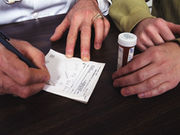U.S. Doctors Still Over-Prescribing Drugs: Survey
More than 1 in 4 say antibiotics are given when the drugs will likely do no good.
Despite evidence that certain drugs aren't always necessary, doctors are still prescribing these treatments, a new survey of doctors reveals.

Antibiotics are by far the drugs most frequently used in situations where they'll provide no value for patients. The survey found that more than a quarter of doctors surveyed (27 percent) said that antibiotics are often administered to patients when the drugs will do no good.
In most cases, the antibiotics are prescribed to treat upper respiratory infections even though these are most often caused by viruses unaffected by the medication, said Dr. Amir Qaseem. He's vice president of clinical policy for the American College of Physicians (ACP) and chair of the ACP's High Value Care Task Force.
Other treatments that doctors use frequently despite their questionable value include aggressive treatments for terminally ill patients (9 percent), drugs prescribed for chronic pain (7 percent), and dietary supplements such fish oil and multivitamins (5 percent), the survey revealed.
"There is a lot of waste in our health care system, and we need to acknowledge that," Qaseem said.
The results are from a random survey of 5,000 ACP member physicians. The survey asked doctors to identify two treatments frequently used by internists that were unlikely to provide high value care to patients.
"Value is not the same as cost," Qaseem said. "High value is a function of the benefits, harms and cost of an intervention all together. Just because something is very expensive does not make it a poor value. There are expensive treatments that provide high value."
Antibiotics were most commonly cited as being used under questionable circumstances, despite mounting concern regarding the rise of antibiotic-resistant "superbugs."
In the United States, at least 2 million people a year are infected with bacteria that are resistant to antibiotics, and at least 23,000 die as a direct result of these infections, according to the U.S. Centers for Disease Control and Prevention.
The CDC itself estimates that as much as one-half of antibiotic use in humans is either unnecessary or inappropriate. An estimated 47 million unnecessary antibiotic prescriptions are handed out in the United States each year, the agency said.
Pressure to fulfill patients' expectations might be driving some doctors to prescribe antibiotics, Qaseem said.
"If a patient shows up in a physician's practice and they have an upper respiratory tract infection, it is most often viral and will resolve itself in a few days," Qaseem said. "You tell the patient to go home, rest, and it will be OK, but generally the expectation of a patient is that you will do something more than that."
Physicians also might be practicing defensive medicine to ward off potential malpractice suits, or trying to meet clinical performance measures that call for blanket treatments that must be applied to all patients, Qaseem said.
Dr. Michael Munger is president-elect of the American Academy of Family Physicians and a family doctor in Overland Park, Kansas. He said that prior experience and institutional history also plays a role.
"The thought and common wisdom was that a great deal of upper respiratory infections were bacterial in nature, and thus an antibiotic treatment would be necessary," Munger said.
"The beauty of following a discipline in primary care is that you continue to evaluate what you do, look at the evidence and what does the evidence support," he continued. "We're recognizing now emerging studies that show most of upper respiratory infections are viral in basis as opposed to bacterial, so now it's a process of changing practice habits."
Qaseem and Munger agreed that patients should feel free to question their doctor about prescribed medications and treatments, rather than accepting things at face value.
"I personally welcome it," Munger said, "because I have a partnership with a patient, and part of my role is to fully inform a patient of what they have and what the treatment options are."
Patients already are starting to question prescriptions for antibiotics, probably based on media attention around antibiotic-resistant bacteria, Munger noted.
"I had a recent case of pneumonia, and I said, 'We need to use antibiotics,'" he recalled. "She said, 'Are you sure?' and I had to reassure her that this was the best course."
On the other hand, patients now are beginning to learn through their doctors that many dietary supplements cost a lot but do little to no good.
"We're getting now evidence to say to the patient, 'You know, you really don't need this supplement. This won't be helpful to you," Munger said. "In most cases, they'll say, 'Oh wow, I thought I was doing myself a favor. If I can save some money, I won't do it.'"
Source: HealthDay News
- 297 reads
Human Rights
Ringing FOWPAL’s Peace Bell for the World:Nobel Peace Prize Laureates’ Visions and Actions

Protecting the World’s Cultural Diversity for a Sustainable Future

The Peace Bell Resonates at the 27th Eurasian Economic Summit

Declaration of World Day of the Power of Hope Endorsed by People in 158 Nations

Puppet Show I International Friendship Day 2020

